Aggregator
The Muslim Book Awards 2025 Winners
Each year, the judges of the Muslim Book Awards spend time and thought on choosing the best Muslim books of the year. We look for quality of writing, rich and unique stories, and most importantly, Islamic values being upheld and highlighted.
After much reading, discussion, and passionate thoughts, the judges have finally cast their ballots – and the Muslim Book Awards 2025 winners are in!
Best Toddler Book
Here’s Our Religion is a unique giant-sized board book that kids will turn to over and over again! Rather than telling a story, this book introduces images and short descriptions of important Islamic concepts and themes, such as Ummah, Qur’an, Salah, Ramadan, Zakat/Sadaqa, Hajj, and Sunnah.
Best Picture Book
Saif’s Special Patches is about a little boy who is shy – but also much more than “just shy”! The patches in his special quilt represent all the different instances that Saif has been persistent, helpful, brave, and smart – and remind him that even though it’s not easy learning how to swim or knowing how to help out at the masjid, he can do it!
Best Young Adult
Huda F Wants to Know? does a lot more than just crack jokes. This latest installment in the Huda F series starts with Huda preparing for her junior year of high school, with laser focus on ACT exam prep, applying for scholarships, and getting her driver’s ed done. What she didn’t expect was her parents telling her that they’re getting a divorce. This graphic novel does what I never expected a comic series to do: explore mental health, friendship, and family relationships with care and nuance.
Best Adult Fiction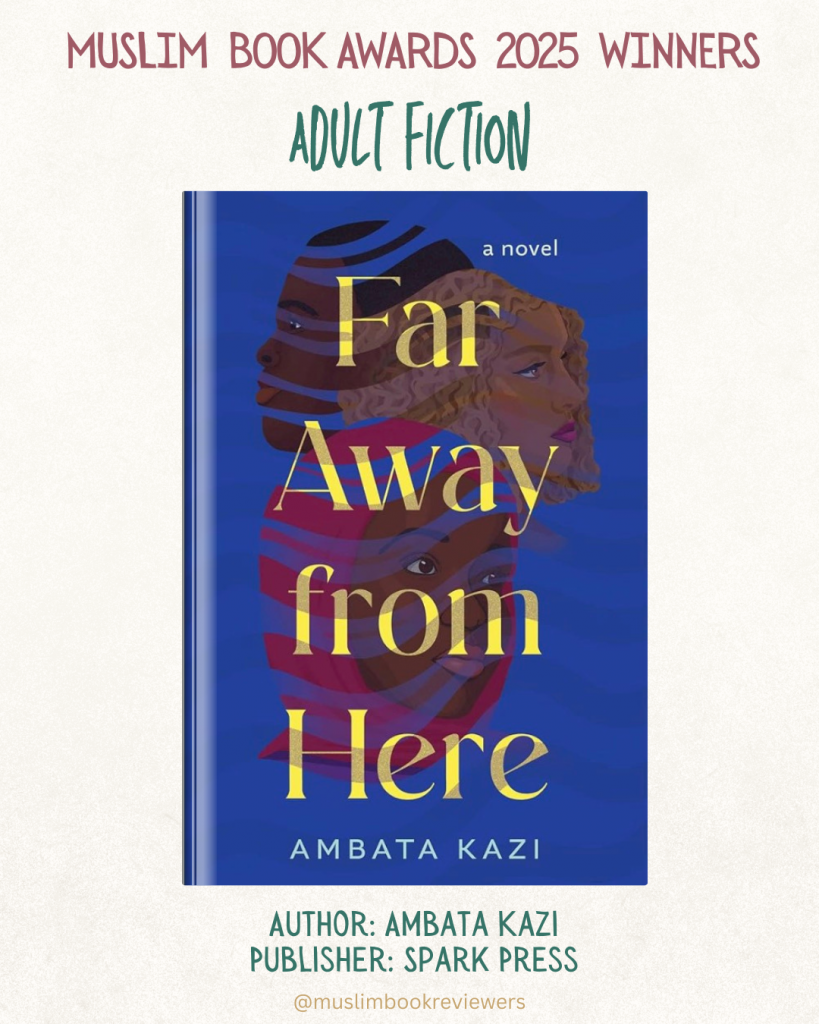
“Far Away from Home” is a brilliant debut that brings us the story of three Black Americans Muslims in New Orleans, set after Hurricane Katrina. Weaving together spiritual journeys, personal struggles, and the history of Black Muslims in the American landscape, this book is deeply immersive and reminds readers of the power of faith in Allah.
Best Holiday Book
“The Eidi Bag” isn’t just a story about celebrating Eid al-Fitr; it’s a story of culture, faith, anticipation, disappointment, change, and appreciation. It is Sarah’s first Eid in a new country and she has made herself a new Eidi bag just for the occasion! But it turns out that Eid traditions in this different place aren’t quite the same as back home. Sarah longs for Pakistan and the traditions that she is used to, but she slowly realizes that different traditions can also be fun and filled with love and joy.
Best Juvenile Non-Fiction
“Shining Hearts: Sahabah Stories for Kids” by Marium Uqaili introduces both male and female companions (five of each) in a way that isn’t dry or too detail-heavy. The text is spaced out well on the pages, with small side facts and questions laid out as well. This is excellent for 5+ as a learning resource!
Best Adult Non-Fiction
“The Heart of Design: Spirituality, Creativity and Entrepreneurship” is a brilliant examination of Islamic principles in the context of design, business, creative pursuits, and more. The book connects personal spiritual lessons with external practice, highlighting how one can cultivate a holistic higher praxis. Lush in layout and rich in content, this book will linger with readers long after they’re done, inviting them to return over and over again.
Best Illustrations
“Dear Moon” is a visually gorgeous book that serves as the perfect coffee table book or gift to loved ones. Characterized by soft colour schemes, sweet hijabi characters, and Islamic reminders, this book is a delight to the eyes and the heart. This book is a collection of Zayneb Haleem’s best work, quoting Quranic ayaat and other gentle Islamic reminders. Whether you’re an adult who just needs a glimpse of joy, or a young one who loves pretty illustrations, this book will definitely be picked up and flipped through often.
Judges’ Choice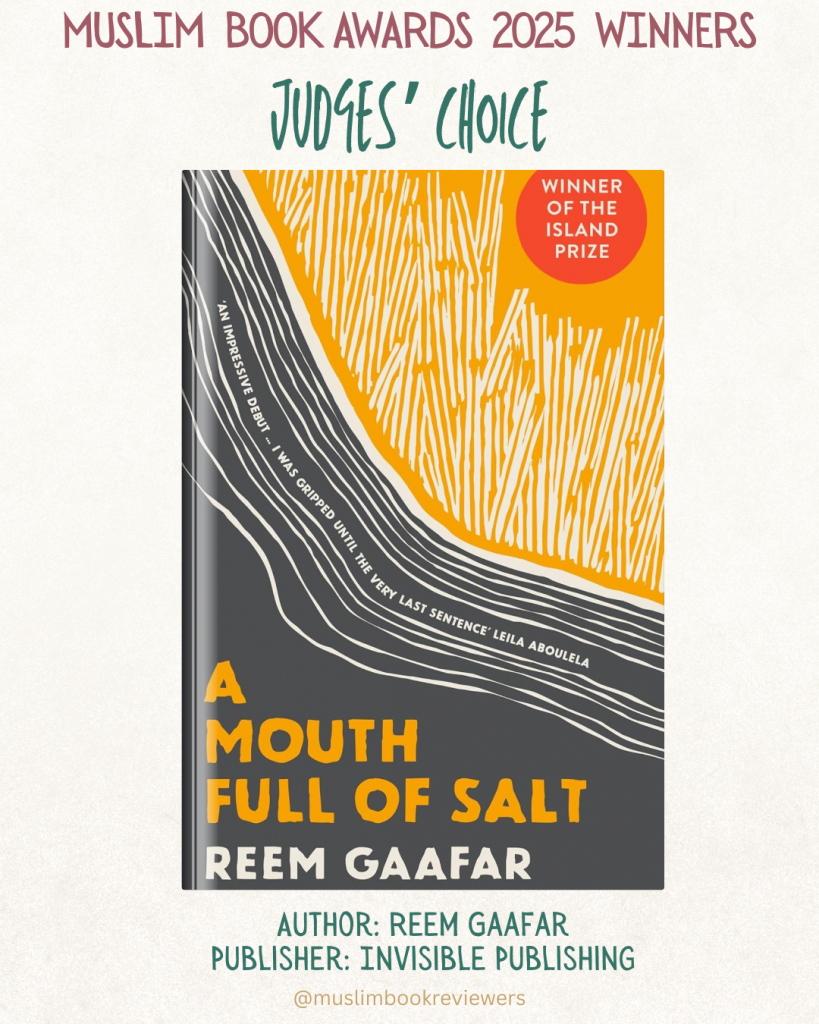
“A Mouth Full of Salt” is a tale of long-ago (and yet not that long ago) Sudan that meanders like the Nile, but with a powerful undercurrent that pulls you to its end. A little boy drowns in a village, setting off a chain of tragedies and discoveries that uncover generational secrets. The women at the peripherals of the village are much more than sideline observers; their lives underscore the village’s past and future.
Bookseller’s Choice
Everything Grows in Jiddo’s Garden is the story of a young Palestinian girl and her Jiddo.
Jiddo’s garden is a wonder. In it grows so many amazing things—to see, smell, and taste. But helping him to tend the garden teaches this young girl about even more than fig trees. It gives her a chance to discover just who she is. Many years ago, like so many Palestinians, her family was forced to leave their homeland. But Jiddo shows her how, until they can return, tending a garden can connect them to home—and to each other!
Congratulations!
Congratulations to all the winners of the Muslim Book Awards 2025!
[DON’T FORGET! SPECIAL COUPON CODE: Use the coupon code “MBR” for 15% off all products ordered from Crescent Moon Bookstore!]
Related:The post The Muslim Book Awards 2025 Winners appeared first on MuslimMatters.org.
Going back to Gaza's broken universities
BBC's pro-Israel training is nothing new
Livestream: Q&A and the assassination of Abu Obeida
In a year-end special, co-hosts answer questions and speak to Ahmed Alnaouq and Abubaker Abed.
Swiss court rules Ali Abunimah detention was illegal
Zurich authorities violated the Swiss constitution and the European Convention on Human Rights.
An Iqbalian Critique Of Muslim Politics Of Power: What Allamah Muhammad Iqbal’s Writings Teach Us About Political Change
In 1937, philosopher-poet and perhaps the foremost intellectual of Muslim India, Allamah Muhammad Iqbal, wrote a series of letters to the leader of the All Indian Muslim League and eventual founder of Pakistan, Muhammad Ali Jinnah.
Over the years, Iqbal and Jinnah had come to share a deep respect and admiration for one another – a respect that had not always been the case. When Jinnah agreed to the Lucknow Pact almost 20 years earlier, for example, Iqbal fiercely criticized and refused to acknowledge it.1 Over time, however, Jinnah would recognize Iqbal as “the sage-philosopher and national poet of Islam,”2 and Iqbal would recognize Jinnah as “the only Muslim in India today to whom the community has the right to look up for safe guidance.”3 When coupled with the poetics of Iqbal, these letters offer us tremendous insight into Iqbal’s own thought, particularly his emphasis on the integration between the theological, cultural, political, economic, and social.
Perhaps the most important of these letters is the seventh, written on the 28th of May, 1937. In this letter, Iqbal confronts the problem of the Muslim League’s popularity with the very population it claims to serve. To Iqbal, the primary problem of India was not simply British rule – it was colonialism as a social, economic, and political ordering of society. In his warning to Jinnah, Iqbal presciently warns the statesman of replacing one colonial class with another. If, Iqbal warns, the offices of the Muslim League are simply made up of aristocrats and their friends and relatives, the Muslim League will not achieve its primary objective: the economic and cultural advancement of Muslims in India. Iqbal warns Jinnah that:
“The league will have to finally decide whether it will remain a body representing the upper classes of Indian Muslims or the Muslim masses who have, so far, with good reason, taken no interest in it. Personally, I believe that a political organization that gives no promise of improving the lot of the average Muslim cannot attract our masses. Under the new constitution, the higher posts go to the sons of upper classes; the smaller ones go to the friends or relatives of the ministers. . .the question therefore is: how is it possible to solve the problem of Muslim poverty? And the whole future of the League depends on the League’s activity to solve this question.”4
Although the problem of the Muslim League lay in the framework of its governing structures and could be remedied by smart politics, in contrast, Iqbal was deeply pessimistic about Congress’s capacity to do the same for Hindu India. In particular, Iqbal was suspicious of the political leader of the Indian National Congress, Jawaharlal Nehru, and what he called his “atheistic nationalism”:
“I fear that in certain parts of the country, e.g., N.W. India, Palestine may be repeated. Also, the insertion of Jawaharlal’s socialism into the body-politic of Hinduism is likely to cause much bloodshed among the Hindus themselves. The issue between social democracy and Brahmanism is not dissimilar to one between Brahmanism and Buddhism. Whether the fate of socialism will be the same as the fate of Buddhism in India, I cannot say. But it is clear to my mind that if Hinduism accepts social democracy, it must cease to be Hinduism. For Islam, the acceptance of social democracy in some suitable form and consistent with the legal principles of Islam is not a revolution but a return to the original purity of Islam.”56
The structure of his argument, and particularly his fierce critique of Nehru, reveals much about Iqbal’s own thinking about society. If the primary objective of politics is the cultural and economic upliftment of society, then that upliftment is dependent on the political structures that organize it; those political structures themselves, however, are dependent on the cultural base that supports it; and that cultural base is dependent on the self-imagination of the members of that society. In his dual critique of both Congress and the Muslim League, Iqbal makes a prophetic assertion: the failure of the Muslim league will be due to the aristocratic and landed-elite’s dominance over the political structure; the failure of the Indian National Congress will be because Nehru’s “atheistic socialism” will create a civil war within “Brahmanism” itself, because the very basis of political structures – culture – will be incompatible with the political structure Nehru will try to erect.
The centrality of caste-based thinking that acts as a lens in the mind of contemporary Hinduism would create significant tensions with Nehru’s utopian socialism; a tension that would eventually erupt in a socio-cultural civil war within Hinduism itself. For the Muslim mind, however, such ideas of “social democracy” as he called it – a shorthand for economic parity and meritocracy – were ideas embedded within the Muslim’s imagination of his own past. The shari’ah itself guaranteed economic justice; the sunnah of the Prophet, peace and blessings be upon him, recommended a meritocratic distribution of labor regardless of lineage.
Iqbal proves prophetic in both his critiques: India, which is embroiled in an intense socio-cultural civil war over the nature of Hinduism, is one of the world’s most unequal countries today; and the military-landholder alliance of convenience that dominated Pakistan’s politics after the assassination of Liaquat Ali Khan in 1951 has concentrated all political and cultural power in the hands of a small aristocratic elite and brought the country to the brink of civil war.
Iqbal would also anticipate the post-colonial and subaltern thinkers who began writing in the 1960s: colonialism is not simply a form of conquest built upon the imagination of a civilizational hierarchy; it is a particular manifestation of a general category of extractionary governance that is built upon the nexus of socio-cultural beliefs and practices that are enshrined in a political structure which extracts economic benefit from the many and collects it in the hands of a few.
Colonialism may have ended in its most explicit forms, but colonialism as a form of governance is more prevalent today than it was in the 1850s.
Neo-Liberal Extraction and the Culture of CapitalismThe fall of the Soviet Union marked a distinctive shift in the world’s socio-economic imagination. There was no longer any need to debate the merits of capitalism and liberal democracy; we had, in the words of Francis Fukuyama, reached the end of history. Liberal democracy and neo-liberal capitalism had clearly demonstrated themselves in a cold-war of social darwinism as the most ideal forms of human socio-economic organization, and all that was left was for the rest of the world to “catch up” to these discoveries. The last 40 years, in general, and 34 years in particular, have been a global experiment on a general cultural framework: individual greed is the driver of all goodness in society.
When Milton Friedman declared that “greed is good,” he also declared that all good is a product of human greed. This thinking has become increasingly indicative of the Western mind, a continuous shift from the glorification of austerity and poverty by the Catholic Church centuries earlier. And, so, as a practice of social, cultural, and political policy, all the Western world has continuously unleashed greed, positioning it not as a vice to be remedied but the primary producer of the greater good of man. And, as always, it is the Quran that is most prophetic:
“Know that this worldly life is no more than play, amusement, luxury, mutual boasting, and competition in wealth and children. This is like rain that causes plants to grow, to the delight of the planters. But later the plants dry up, and you see them wither, then they are reduced to chaff. And in the Hereafter, there will be either severe punishment or forgiveness and pleasure of Allah, whereas the life of this world is no more than the delusion of enjoyment.” [Surah Al-Hadid; 57:20]
Unleashed capitalism, undergirded by a the conception of the self rooted in material individualism (as opposed to Islam’s radical spiritual individualism), has wrought untold destruction on the earth, perpetuated the televised genocide of entire peoples; thrown country after country into social and political upheavel; all in the name of greater capital accumulation which has turned the whole world’s economy into a vacuum that sucks the wealth of the many into the hands of a few.
Returning to our frame story of Iqbal’s letters to Jinnah, and to the greater thinking of the philosopher-poet himself, we are confronted with a significant problematic of our own conceptions. After the genocide in Gaza and the utter ineffectiveness of Muslim politics in all its manifestations – from access-based establishment politics to anti-establishment protest movements – there has been a greater call for Muslims to “create” power. While well-meaning, many of these calls prove to be simplistic and counter-productive in their understanding of achieving power in a thoroughly broken world order.
Projects for wealth generation perpetuate structures of extraction; projects for culture reinforce the structures of material individualism; projects for political participation reinforce the illegitimate dominance of elites over social systems. The discourse of “navigating” the system quickly turns into one reinforcing it – to simply become integrated into a ruling class of destruction to further advance one’s political objectives.
And, yet, power is indeed very powerful; and simply ignoring the mechanisms of power or refusing to participate within them leaves one at the mercy of those who would deploy the levers of power against you. Muslims are therefore trapped in a conundrum that seems impossible to solve: refusing to engage in existing structures is to become exploited by them; engaging in them turns one into a participant in competitive exploitation.
Iqbal’s Relevance TodayThis, perhaps, is where Iqbal is most prescient and informative. At the core of Iqbal’s entire philosophical project, one which I will write about more extensively, is a critique of modern modes of social organization as a critique of the very imagination of being itself. To Iqbal, the material reality is created by conceptual understandings; and those conceptual understandings are rooted in an imagination of the self as a purely material being. Where Western thought has seen the world in binaries, the most important of which are the body and the soul, Iqbal, as an inheritor of the Islamic philosophical tradition, rejects every binary possible.
The root of Western dysfunction is the abandonment of the soul, where Christianity abandoned the body. The root of Christian dysfunction is where Christianity abandoned law for spirituality. The root of philosophical dysfunction is where philosophy abandoned intuition for thought. All dysfunction is rooted in imaginations of oppositional binary, where one of two concepts must be chosen at the expense of the other.
In the Quran, however, all matters are integrated: the soul is integrated with the body; the legal is integrated with the material; the material is integrated with the metaphysical. The rectification of human society, therefore, is to remind the human of what they truly are, of what the world is, of what all of reality itself is. The human is most alone when he attempts in vain to find meaning in materiality alone. He is most prone to his own self-destruction – and the destruction of all of the world and humanity itself – when he seeks to fill the God-sized hole in his heart with materiality. It is when man is most estranged from the reality of himself that he becomes entirely estranged from God.
Iqbal encapsulates it best in a couplet, when he says in the Javidnama:
به آدمی نرسیدی ، خدا چه میجویی
ز خود گریختهای آشنا چه میجویی
“You haven’t reached (the reality of) Man;
For what do you seek God?
From one accustomed to fleeing
From himself – what do you seek?”
Man has forgotten himself, so man has forgotten God; but the world only makes sense when it finds its sense in God. The world is in need of a return to God; nothing can escape the need for God – not as a trite contemporary spiritualism which assuages the guilt of materialism, but as an inextricable part of self-imagination that manifests in an ethic of action rooted in passionate pursuit of the love of God.
We lack the love to seek Allah  , so we lack the vision of ourselves, the world, and the universe that is a gift from Allah
, so we lack the vision of ourselves, the world, and the universe that is a gift from Allah  .
.
There is much more to be said, much more to be written, much more to be explored, but, for now, let it suffice to say:
قلندریم و کرامات ما جهانبینی است
ز ما نگاه طلب ، کیمیا چه میجویی
“We are dervishes, and our miracle
Is the ability to see the world
Seek the capacity to see from us –
For what do you seek alchemy?”
Related:
– The Tolling Bell Of Revolution – Why The World Needs Allamah Muhammad Iqbal Now More Than Ever
– Islam, Decoloniality, And Allamah Iqbal On Revolution
1 The Lucknow Pact was an early agreement between the Indian National Congress and the All Indian Muslim League in which Muslims were given greater representation in Hindu-majority provinces in exchange for non-Muslim majority in representative bodies in Muslim-majority provinces. Iqbal was a vocal critic of the pact, as he saw it as a majoritarian ruse of tokenizing Muslims in Hindu-majority provinces in exchange for stripping Muslims of agency in Muslim-majority provinces.2 Letters of Iqbal, 2363 Letters of Iqbal, 2584 Letters of Iqbal, 2545 Letters of Iqbal, 2556 Iqbal likens the struggle between social-democracy and “Brahmanism” – that is, Brahmanic control of all Indian levers of political and economic power – to the struggle between Brahmanism and Buddhism. Buddhism started in India but never truly flourished there and found most acceptance in non-Hindu regions. Iqbal intimates that this is due to the logic of caste in Hinduism which is incompatible to the core message of Buddhism.
The post An Iqbalian Critique Of Muslim Politics Of Power: What Allamah Muhammad Iqbal’s Writings Teach Us About Political Change appeared first on MuslimMatters.org.
Muslim Book Awards 2025: Finalists
The Muslim Book Awards is the literary event of the year (at least, we’d like to think so!) – and we are delighted to announce the 2025 Muslim Book Awards Finalists!
Each year, the MBA judges dedicate their time to going through books by Muslim authors and illustrators, for audiences of all ages. Our mission is to find the best books of the year, combining Islamic values with storytelling craft, creativity, and publication quality. Whether self-published, Muslim-published, or traditionally published, MBA holds every Muslim story to the standard of Ihsaan… because Muslim readers deserve the best!
After many hours spent poring over the 2025 submissions, we present the 2025 Muslim Book Awards Finalists!
Many of the books can be ordered from our sponsor, Crescent Moon Bookstore, and a link has been provided for each title. Read through the whole post to find our special Coupon Code at the end, and get a discount off your order!
[Note: This year, we did not receive enough submissions for the Early Reader/ Chapter Book and Middle Grade categories to include them in the finalists.]
Toddler Books
Street Puppy, Masjid Cat is sweet picture book all about a street puppy and masjid kitten, who live very different lives – yet cross paths unexpectedly. The simple rhymes contrast the street puppy’s life to that of the pampered cat in the masjid, and the vibrant illustrations evoke the lushness of Southeast Asia.
Dark Nights and Light Hearts: A Muslim Book of Opposites continues Hena Khan’s series of toddler books introducing colors, shapes, and now opposites! The heartfelt rhymes, the centering of Islam, and the enveloping illustrations make these books timeless, sought after, and beloved.
Momo & Bronty’s First Book About Allah is a sturdy board book that uses bright illustrations and simple language to introduce the concept of Allah to the youngest members of the Ummah. This book covers concepts like the oneness of Allah, Allah as the Creator and the All-Hearing, and our ultimate goal of reaching Jannah.
My First Book About Ramadan is also a continuation of a great Muslim board book series that teaches little Muslims the basic fundamentals of Islam. The soft, glowing illustrations creates a loving positive relationship between young readers and what they’re learning about, establishing the beginnings of a lifelong connection to Islam, inshaAllah.
Here’s Our Religion is a unique giant-sized board book that kids will turn to over and over again! Rather than telling a story, this book introduces images and short descriptions of important Islamic concepts and themes, such as Ummah, Qur’an, Salah, Ramadan, Zakat/Sadaqa, Hajj, and Sunnah.
Picture Books
The City of Jasmine is a celebration of a land beloved to Muslims, one which has finally been freed from decades of tyranny. Nadine Presley’s gorgeous descriptions of the Umayyad masjid, Qal’at Dimashq, the Barada river, marketplaces and bookstores and kitchens and courtyards, are a love letter to the blessed lands of Shaam.
Hilwa’s Gifts is a beautiful slice of Palestinian life, showcasing joy and tradition. Ali is visiting his family in Palestine, and it’s olive harvest season! Seedo teaches Ali the traditional method of harvesting olives, with love and care, and the journey that the olives will take into becoming gifts that keep on giving.
Saif’s Special Patches is about a little boy who is shy – but also much more than “just shy”! The patches in his special quilt represent all the different instances that Saif has been persistent, helpful, brave, and smart – and remind him that even though it’s not easy learning how to swim or knowing how to help out at the masjid, he can do it!
All the Ways to be Pretty provides an Islamic approach to internal beauty to counter the societal emphasis on external appearance, by drawing on the examples of Ai’shah (RA), Khadija (RA), Sumayyah (RA), Maryam (RA), Hajar (RA), and Rufaidah (RA), may Allah swt be pleased with them all.
Young Adult Books
Huda F Wants to Know? does a lot more than just crack jokes. This latest installment in the Hua F series starts with Huda preparing for her junior year of high school, with laser focus on ACT exam prep, applying for scholarships, and getting her driver’s ed done. What she didn’t expect was her parents telling her that they’re getting a divorce. This graphic novel does what I never expected a comic series to do: explore mental health, friendship, and family relationships with care and nuance.
“Odd Girl Out” is a Muslamic take on quintessential YA: a teenager going through big life changes, dealing with the drama… and in this case, also facing Islamophobia. Maaryah Rashid’s life is uprooted by her parents’ divorce, in more ways than one. She has to leave behind her glamorous life in Dubai to live in the middle of nowhere, Essex; she’s the only hijabi at her school and the target of a nasty Islamophobic bully; and her mom is so busy falling apart after the divorce that she doesn’t seem to notice Maaryah’s own grief, loneliness, and struggles. There are repeated references to salah, hijab as an act of worship, and what being Muslim means in the West.
As with all Muslamic YA that touches on various teenager-y things (boys, parties, various haraamness), I recommend this for 15+ and for parents to be willing to have discussions with their children on these topics.
Hand Me Down Your Revolution is a collection of short stories, poems, and memoir essays produced by Muslim Youth Musings, a fantastic literary organization for aspiring Muslim writers. From the magical realism of “Where the Crimson Roses Bloom” to the amusing “Jamal’s Kufi,” the deeply moving “A Love Letter to Muslim Kids in Public Schools” the gorgeous prose of Rituals for the Grieving” and “Mother Wound,” there’s a little something for everyone.
Adult Fiction
“The Slightest Green” is a multi generational novel weaves a narrative that will stay with the readers for the warmth and depth it explores of a fictional Palestinian family. The characters and their stories, their trauma and dreams are very tied to Palestine and the occupation, but the focus on the individual and the ripple effects will linger.
“Detective Aunty” is on the case! Kausar Khan is a widow who’s always had a knack for figuring things out, and when her daughter is accused of murder, she knows she has to do more than cook, clean, and keep an eye on her granddaughters. The problem is… no one else, including the real killer, is happy that she’s investigating! Billed as a cozy mystery, this book also touches on larger themes of grief and loss, estranged family relationships and healing, and even thoughtful reflections on growing older as a desi woman.
“A Mouth Full of Salt” is a tale of long-ago (and yet not that long ago) Sudan that meanders like the Nile, but with a powerful undercurrent that pulls you to its end. A little boy drowns in a village, setting off a chain of tragedies and discoveries that uncover generational secrets. The women at the peripherals of the village are much more than sideline observers; their lives underscore the village’s past and future.
“Far Away from Home” is a brilliant debut that brings us the story of three Black Americans Muslims in New Orleans, set after Hurricane Katrina. Weaving together spiritual journeys, personal struggles, and the history of Black Muslims in the American landscape, this book is deeply immersive and reminds readers of the power of faith in Allah.
Holiday Books
“The Eidi Bag” isn’t just a story about celebrating Eid al-Fitr; it’s a story of culture, faith, anticipation, disappointment, change, and appreciation. It is Sarah’s first Eid in a new country and she has made herself a new Eidi bag just for the occasion! But it turns out that Eid traditions in this different place aren’t quite the same as back home. Sarah longs for Pakistan and the traditions that she is used to, but she slowly realizes that different traditions can also be fun and filled with love and joy.
“Ramadan on Rahma Road: A Recipe Storybook” introduces us to Rahma Road, where Muslims of many diverse backgrounds get together to observe Ramadan together. Each spread features a glimpse of a family’s iftar prep, and a recipe for the meal that comes from the diverse backgrounds: roti bom for Malaysians, koshary for Egyptians, and even South African rep with bunny chow!
“Ibraheem’s Perfect Eid” is a sweet story about a little boy realizing there is more to Eid than presents. While Ibraheem is very worried about whether he got presents or not, this also incorporates references to the Sunan of Eid, shows Eid salah (and Ibraheem actually listening to the khutbah!), and niqabi rep in the illustrations.
Juvenile Non-Fiction
“40 Hadiths for Children” covers 40 short, easy-to-understand ahadith about good actions, good character, worship, and daily life. The hadith text is featured on the left page, while the next page briefly explains the hadith in child-appropriate language, alongside practical tips on how to implement the hadith. This is great for parents to read with their kids (short and sweet to incorporate into a daily khaatira), and madrasah teachers
“Eliyas Explains What Prophet Muhammad (sallAllahu ‘alayh wa sallam) Was Like” continues Zanib Mian’s unique storytelling style of goofy-but-relatable kid escapades as a vehicle to delve into Islamic themes and discussions. Eliyas learns all about RasulAllah (sallAllahu alayhi wa sallam) from his parents and uncle – and how to apply the Prophet’s character to his own everyday life. As with every Eliyas Explains book, this one is perfect for kids who have otherwise short attention spans. It’s an easy to read early chapter book, there are different fonts and little illustrations to engage young readers’ attention.
“Shining Hearts: Sahabah Stories for Kids” by Mariuk Uqaili introduces both male and female companions (five of each) in a way that isn’t dry or too detail-heavy. The text is spaced out well on the pages, with small side facts and questions laid out as well. This is excellent for 5+ as a learning resource!
“Game Changers: Stories of Hijabi Athletes from around the World” features Muslim women (specifically hijabis) from around the world, engaged in a wide variety of sports. From hockey to archery, parkour to skateboarding, it was impressive to see all the fields Muslimas have excelled in. Detailed backmatter discusses why Muslim women wear hijab, and touches on related issues such as modest sportswear and perseverance.
“The Prince of Stars: Ulugh Beg’s Quest to Map the Stars and Seasons” is a rich, visually stunning exploration of a figure of Islamic history. Ulugh Beg was a Timurid Muslim prince whose true passion lay in studying astronomy, leading to discoveries that would change the course of science forever. While this is targeted at 4-8 year olds, even older children go back to this book to read, learn, and re-live the adventure!
Adult Non-Fiction
“One Day, Everyone Will Have Always Been Against This” is a blistering reckoning of the genocide of Palestinians, and the larger geopolitical context in which Zionist occupation and Western imperialism have become the status quo. This book is for a generation that understands the west can no longer be trusted to police and guide the world, or its own cities and campuses. It draws on intimate details of Omar’s own story as an emigrant who grew up believing in the western project, who was catapulted into journalism by the rupture of 9/11.
“Bigger Than Divorce: A Muslim Woman’s Path to Healing and Purpose” is unique contribution to non-fiction, tackling the difficult subject of divorce and its aftermath. The book’s approach is pragmatic; there is no wallowing in angst and self-pity, but rather acknowledging the hard emotions of divorce, and then moving forward in a spiritually and emotionally healthy way. The author grounds her work in spiritual wellbeing, beginning with considering one’s purpose in life as a slave of Allah, and using our relationship with our Creator as the foundation of building the next chapter of our life post-divorce.
“The Heart of Design: Spirituality, Creativity and Entrepreneurship” is a brilliant examination of Islamic principles in the context of design, business, creative pursuits, and more. The book connects personal spiritual lessons with external practice, highlighting how one can cultivate a holistic higher praxis. Lush in layout and rich in content, this book will linger with readers long after they’re done, inviting them to return over and over again.
Illustrations
“Lulu in the Spotlight” is a delightful romp through a typical desi wedding! Lulu is finally old enough to have a plan of her own for winning the prize during joota chupai, and Natasha Khan Khazi’s illustrations truly convey the excitement, emotions, and colors of South Asian weddings.
“Animals Love Qur’an” is the official songbook for the classic Dawud Wharnsby Ali nasheed of millennial childhoods! Azra Momin’s signature illustrations bring the classic lyrics to life, evoking nostalgia in us parents and passing on this beloved childhood song to the next generation.
“Dear Moon” is a visually gorgeous book that serves as the perfect coffee table book or gift to loved ones. Characterized by soft colour schemes, sweet hijabi characters, and Islamic reminders, this book is a delight to the eyes and the heart. This book is a collection of Zayneb Haleem’s best work, quoting Quranic ayaat and other gentle Islamic reminders. Whether you’re an adult who just needs a glimpse of joy, or a young one who loves pretty illustrations, this book will definitely be picked up and flipped through often.
“Ibraheem’s Perfect Eid” is a sweet story about a little boy realizing there is more to Eid than presents. Nabila Adani’s illustrations show important parts of the story, like Ibraheem listening to the Eid khutbah, and the wide diversity of the Ummah being represented.
“Sunflower Kisses” might be another hijab story for girls, but Hatice Kubra Erkut’s bright illustrations create vivid imagery of a magical glow flowing from Ayah’s hijab. Celebrating Muslim illustrators and artists starts with appreciating their work in all its forms, and “Sunflower Kisses” is a lovely way to witness Erkut’s work for the first time.
Bookseller’s Choice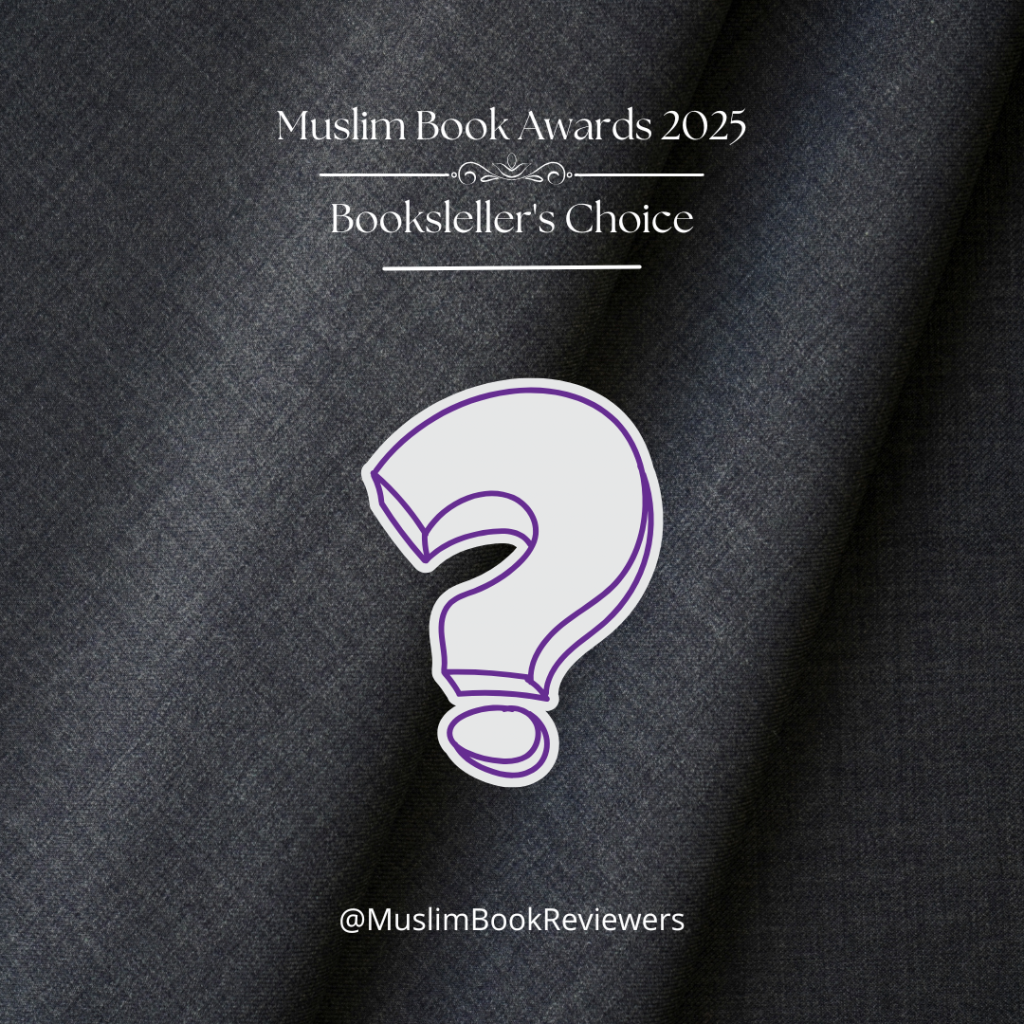
Check back on January 12th to see our reveal for the Bookseller’s Choice book this year!
Don’t forget to stay tuned for our announcement of the winners next week, inshaAllah!
[SPECIAL COUPON CODE: Use the coupon code “MBR” for 15% off all products ordered from Crescent Moon Bookstore!]
Related:The post Muslim Book Awards 2025: Finalists appeared first on MuslimMatters.org.
Hierarchitis

Recently I listened to two BBC podcasts in the Crime Next Door strand. One was about the kidnapping of Lesley Whittle, the teenage daughter of a local bus company boss, in the mid 1970s by a notorious serial armed robber and killer named Donald Neilson and was found hanged in a storm drain under a public park; the other (Death on the Farm) was about a brother and sister, Griff and Patti Thomas (right), murdered in a farmhouse in west Wales around the same time, a death ruled a murder-suicide by the police, the coroner and the chapel pastor who refused them a church funeral, a verdict believed by none of her family and friends. In both cases, a senior detective was in charge who had the reputation for “always getting his man”; in the first, he had solved a number of murders but was new to investigating kidnappings for ransom (as, admittedly, was the whole profession), while in the second, it appears that he did not want to ruin a winning streak by being unable to solve a high-profile murder, so he jumped to the conclusion that it was a murder-suicide because there was no evidence of forced entry. These two stories reminded me of two more recent cases of a killer left to carry on killing or not apprehended as soon as he could have been because of a senior detective sold on a pet theory: the Yorkshire ripper case in the early 1980s, where the lead detective believed the killer was from another part of the country on the basis of a hoax and ignored (and aggressively rebuffed) leads that suggested a local culprit, and the White House Farm murders in which Jeremy Bamber murdered five members of his adoptive family and then tried to frame his adopted sister; the senior detective believed his story, and would only accept that he was wrong when other detectives proved to him that it was physically impossible for the sister to have killed herself with the rifle.
Last week Sue Marsh, a disability activist I came to know while campaigning against the Tory austerity programme of the early 2010s, published an article on her Substack about the culture she found while a patient at Addenbrookes hospital in Cambridge in the 90s and 2000s with Crohn’s disease, an obstructive bowel disorder. While the hospital carried out some pioneering research and some of its doctors were brilliant, there were also consultants who were sold on unscientific and irrational beliefs and treated patients cruelly on the basis of them, and because of the status of Addenbrookes and of Cambridge, what those consultants said and did became common practice. Ultimately the hospital was put in special measures because of botched operations and mistakes known as “never events” (i.e. they should never happen, such as the wrong part of someone’s body being operated on or removed or an instrument left inside them), and the health watchdog Monitor kept them under observation for 18 months, during which surgeries could not go ahead without them present. Even after this, however, doctors trained there at that time were appointed as consultants elsewhere, and good practice was replaced with bad (and cruel) practice learned at Addenbrooke’s. They were spreading like a hospital-acquired infection.
And Sue’s story about how the hierarchies in the health sector undermined good care reminded me of the tragedies and scandals in policing caused by the obsession with hierarchy at the expense of justice, human life or getting the job done (especially when that job was justice or saving lives). People are unable, or face punishment for, raising concerns; they are expected to address a superior officer meekly and always acknowledging their superiority; the superior rank is taken as proof of their being more experienced or better at their job, and though they may have experience, their rank may have had as much to do with impressing the right people at the right time or being in the right social clubs, or discrimination against a competitor because of their race or sex, or something else. Certain people, because of who they are, are assumed to know best, or they are assumed to be right because they were right in the past. In the case of the Pembrokeshire farm murders, the senior detective (DCS Pat Molloy) came from out of area, was a hero from having solved a triple murder in Staffordshire but knew nothing about the local culture and did not speak Welsh, but drew conclusions based on assumptions that anyone familiar with it could have put right, had he listened. All of these situations in policing happened in the 1970s and 80s; no doubt someone will say that this was years ago and the culture of CID has been reformed since and the Ripper disaster could not happen again, though the ongoing scandals about misogyny, domestic abuse by officers going unpunished and sex offences by police officers going unpunished until they kill someone suggests otherwise, at least in some forces.
Hierarchitis affects other institutions as well. For much of the 20th century, co-pilots on civilian airliners could not dissent from their captain, even when the captain was plainly wrong, and planes crashed and whole planeloads of people were lost as a result, because the captain’s mistake could not be challenged. In the book Longitude, Dava Sobel told the story of a naval officer who believed that the ship he was on was a long way from where his superior officer thought, and when he raised his concerns, he was shot for mutiny. The ship then wrecked, as he had said it would, and the surviving crew robbed, and the superior officer murdered. Hierarchies and chains of command are, of course, sometimes necessary and maintaining them in normal times conditions people to act on them when discipline is vital, as during war or a life-and-death situation such as the arrest of a dangerous, wanted criminal or the extinguishing of a big fire. Hierarchitis occurs where they result in bullying, the shouting-down of valid dissenting opinions, the wrong people being promoted and then assumed to be always right because of that promotion, with unjust or lethal consequences for junior staff, patients or the general public.
Republican claims of ‘terrorism’ leave everyone unsafe, Muslim leader warns
Edward Ahmed Mitchell of Council on American-Islamic Relations says Texas and Florida governors abusing power
The deputy director of the US’s biggest Muslim civil rights and advocacy group warns that Republican governors’ steps to declare his organization a “terrorist organization” won’t stop with the Muslim community.
“No governor should have the power to unilaterally declare a civil rights or advocacy group he disagrees with a terrorist organization, take punitive action against them, all in violation of due process and free speech,” Edward Ahmed Mitchell, the deputy director of the Council on American-Islamic Relations, told the Guardian this month. “If any governor can get away with abusing that kind of power, then no organization is safe.”
Continue reading...Far Away [Part 3] – Wounded
A mistake in a crowded street leaves Darius wounded and sick.
* * *
Both Sides MatchCriminals were criminals wherever one went. Having been a low-level criminal myself, I knew the culture, expectations, and rules. These men saw me, a 13-year-old boy, as an easy score in a town that was apparently lawless.
My father had taught me never to reveal my skills before the fight begins. In this way, I could catch the enemy off guard. But I didn’t want to engage in a public brawl that could end up with either me dead, or the blood of these men on my hands. Perhaps if I were to demonstrate my ability to defend myself, these ruffians would seek easier prey.
I settled on a compromise. I already had the spear in my hand. I would strike one of the men hard enough to hurt, but not hard enough to kill, and then wait to see what the other would do.
 A piercing sound made me flinch. A constable came running up, blowing a silver whistle and swinging a baton. So the town was not lawless after all. Like me, the constable wore dark trousers, a knee-length jacket, and cloth shoes with white socks, but he also wore a tall, cone-shaped hat. A badge hung from his waist identifying him as an officer of the law. The overall effect was comical, and I smiled. The constable was not coming for the ruffians or me, but for the two brawling men.
A piercing sound made me flinch. A constable came running up, blowing a silver whistle and swinging a baton. So the town was not lawless after all. Like me, the constable wore dark trousers, a knee-length jacket, and cloth shoes with white socks, but he also wore a tall, cone-shaped hat. A badge hung from his waist identifying him as an officer of the law. The overall effect was comical, and I smiled. The constable was not coming for the ruffians or me, but for the two brawling men.
As I was distracted by this spectacle, the thug with the scarred mouth lashed out with a kick aimed at the inside of my knee. I reacted instinctively, sweeping the spear across the front of my body to redirect his kicking leg. Scar Mouth was fast, however. The kick had only been a feint to distract me from the knife, and he now lashed out with the blade, aiming for my neck. I tucked my head and took the cut across my shoulder, and at the same moment brought up the point of the spear and raked it across the attacker’s face, opening a deep wound from the corner of his mouth to his temple. He cried out and stumbled back, blood pouring from the wound.
“There,” I said savagely. “Now both sides match.” Even as I said these words, I knew I sounded like my father – cold rage was the essence of his personality – yet I did not care. I was furious, more at myself than at Scar Mouth. Like a fool, like a day-one novice, I had allowed myself to be distracted from an imminent threat, and it had nearly cost me my life. Nor had I entered River Flow, the combat state of mind my father had taught me, in which one moved without thought or emotion. What a debacle. My father would be ashamed.
The other ruffian, the red-eyed one, drew his knife and stepped forward, but at that moment another constable came running, whistle piping. Red Eyes picked up his companion, who had fallen to the ground, and tried to hustle him away, but the constable caught them and struck Red Eyes on the back of the head with a wooden baton. He collapsed like a dead man, and the constable proceeded to beat them both.
A Bloody GrinI took the opportunity to walk quickly away, clutching my wounded shoulder. I ducked into a narrow alley between two shops, where laundry hung on ropes overhead, and the ground was littered with broken tiles and scraps of paper. Pressing my back to the wall, I drew a slow breath to steady myself, then removed my jacket – which was now sliced open across the shoulder – and peeled my shirt down to get a look at the wound. The cut ran like a bloody grin across the top of my shoulder. It was long but not deep, yet the edges already looked angry and dirty. Blood ran freely down my arm and abdomen. I was sure the ruffians’ knives were filthy. If I left the cut alone it would surely get infected, and I had no wish to lose an arm… or my life.
The alley was not as empty as I’d hoped. A woman paused at the far end, a basket of scallions on her hip, and stared at me with wide eyes. A pair of boys lingered nearby, whispering to each other, one pointing at the blood on my arm. An old man shuffled past slowly enough to make it clear that he was taking his time so he could watch. He grinned in embarrassment and looked away. Soon, two more people stopped. The city, it seemed, always had eyes.
I had been cut many times while training with my father. My father had always washed the wounds, poured rice wine over them – his drink of choice – and wrapped them in clean cloth.
I ignored the watchers and went to a public water pump at the end of the alley. The water smelled faintly of iron, but water was water.
I gritted my teeth and splashed it over the wound, rubbing gently with the corner of my shirt to wash out any dirt. Blood and water ran down my chest. It stung so badly that my hands shook, but I kept going until the water ran mostly clear.
A vendor’s stall stood just beyond the alley. I pressed a coin onto the counter without meeting the owner’s eye. He frowned at my age, at the blood, but handed me a small clay bottle of liquor. I uncorked it and poured it over my shoulder.
The pain roared up my arm like a wildfire. I might have collapsed if not for the fact that I had been through this before and knew what to expect. My breath hissed out between clenched teeth; my vision wavered. Someone gasped. Someone else muttered that I was mad. I braced my good hand against the wall and waited. When the fire subsided, I dared to look. The blood had slowed. Good enough.
Trust No OneAs I tore a strip from the bottom of my shirt, a shadow fell over me. A woman — middle-aged, with a face like weathered bark and kind eyes — crouched beside me.
“Child,” she said gently, “you’ll ruin that shoulder if you leave it like that. Come to my house. My husband was a soldier. I know how to treat these things properly.”
I hesitated. She did not smell of wine or filth. Her hands were clean. There was nothing cruel in her eyes, only concern. For a heartbeat, I wanted desperately to go with her — to be tended to, spoken kindly to, looked after.
But I did not know her. I trusted no one in this place. My father had drilled this into me quite literally, that no one in this world could be trusted but family, and even then, with reservations. “Do not trust even me,” he used to say, and I knew he meant it, for he had been my tormenter as well as my caretaker.
“My aunt is nearby,” I lied. “She’ll see to it.”
She studied my face, as if weighing my words. Then she sighed, nodded once, and pressed a hand briefly — almost motherly — to my uninjured arm.
“Make sure you keep it clean,” she said. “And change that bandage in the morning.”
She left, and the little audience, sensing the show was done, drifted away. Only the boys remained long enough to give me a last curious stare before running off.
I pressed the folded strip of cloth to the wound and tied it in place with another strip looped under my arm and across my chest. It was clumsy work, but it held. The bandage soon grew warm and damp with blood, but not soaking. I could still move my arm. It was painful, but it moved.
“There,” I muttered under my breath. “So much for my first day in the city. Get it together, Darius.”
I pulled my bloodstained jacket back on, though the movement made me wince, and tightened the spear strap. I smelled like wine, sweat, and copper. I needed to find my aunt. This town was too much for me. The noise, stink, and sense of danger were overwhelming. I felt as out of place as one of the temple carp would be if taken out of the pond and placed upon a horse charging into battle.
For a moment, the image made me smile. A giant carp riding horseback, wearing battle armor and holding the reins, its mouth working as it gasped for air. I laughed out loud, drawing a few open stares from passers-by. The sound of my own laughter, as much as anything that had happened to me so far, frightened me. I sounded like a crazy person.
A woman passing by slowed at the sound. She held the hand of a little girl, perhaps ten years old, who was chewing thoughtfully on a glossy brown sweet skewered on a thin stick. The girl stopped to stare at me openly, her steps lagging until her mother tugged at her hand.
“Come on,” the woman said sharply, not unkindly but with impatience.
The girl resisted, craning her neck to look at me as if I were something curious washed up from the river. Then, to my surprise, she pulled free. Before her mother could stop her, she trotted toward me, the sweet bobbing in her hand.
“Lihua!” the woman called, startled, hurrying after her.
The girl stopped a few paces from me. She did not come too close. She looked at my bandaged shoulder, then at my face, then held out the sweet without a word, her arm fully extended, her eyes lowered in sudden shyness.
I stared at it, uncertain. No one had ever offered me food unprompted before. I took it carefully, as if it might vanish if I moved too fast.
The mother caught up, breathless. I braced myself for her to snatch the child away, to scold her, perhaps to curse me for frightening her daughter.
Instead, she looked at me and said sternly, “What do you say?”
I did not understand. I stood there holding the sweet, mute. “Hello?” I said finally. I looked the girl up and down. “Your dress is pretty.”
The girl giggled, but the mother frowned. “You say, ‘thank you,’” she snapped.
“Oh.” Heat crept up my neck. I had not been raised with such polite expressions. “Thank you,” I said quickly. I bowed deeply to the girl, deeper than necessary, the movement tugging painfully at my shoulder. The girl giggled again, pleased, and allowed her mother to take her hand.
They went on their way, the girl glancing back once, smiling.
I stood there holding the sweet until they were gone. Then I ate it slowly. It tasted of sesame and sugar, and might have been the best thing I had ever eaten. My heart lightened a bit.
I had been told by the Mayor that my aunt’s name was Jade Lee, her husband was Zihan Ma, and they had a child whose name the Mayor did not know. I walked through the streets asking about them. People waved me off, shook their heads, provided conflicting answers, offered to sell me things, and, in the case of one noble, spat on me.
MingWhen I presented my question to an old woman who owned a stand heaped with some kind of orange flower, she looked me up and down skeptically. “Are you Darwish Lee?”
I frowned. “No. I am Darius Lee.”
She snorted derisively. “How does someone not know how to pronounce his own name? Your father is that miserable lout, Yong Lee?”
I was stunned. How could someone know my father’s name in this town? “He’s not a lout,” I said hotly. “He was a peanut farmer, and he is in the army fighting the invaders. He’s… well… the Mayor says he died.”
The woman’s face softened. “I am sorry. To Allah we return. I will not speak ill of the dead.”
So this woman too worshiped the God called Allah. Before I could ask about it, she went on: “Your auntie’s husband, Zihan Ma, is my brother. My name is Ming.” She studied me more carefully. “You have been wounded.”
I tipped my head to the side as if to say, “I suppose so.”
“I am working now,” Ming said, “but if you are hungry you can go to my house and my daughter will feed you.”
I was, in fact, hungry, tired, and hurt, but I had come this far, and I wanted to meet my aunt. I told Ming so, and she gave me directions. I should follow the main road, then turn right when I reach a huge elm tree that shades the entire road. Continue past the temple, walk until I can no longer hear the temple bells anymore, then turn left. From there, it would be a quarter day’s walk. My aunt’s house was set back from the road, but they were the only farm on that road growing safflower, so when I saw the safflower, I should enter through the gate. There I would find my aunt’s house.
“I don’t know what safflowers look like,” I said.
Ming shook her head sadly. “You have a wooden head, don’t you?” She picked up one of the stalks heaped on her stand and shook it in my face. It had small green leaves and a roundish orange flower with spiky petals. Its scent was sweet but mild. “This is a safflower, strings-for-brains. From your auntie’s farm, in fact.”
A Long WalkBefore setting out, I bought a wedge of cheese and filled my gourd flask at a public well. I slung the spear over my good shoulder and started down the road Ming had described.
The town fell away behind me, swallowed by dust and distance. The sounds of carts and hawkers faded, replaced by the quiet tapping of my own footsteps and the soft slosh of water in the gourd. The road was lined here and there with elms and poplars, their leaves whispering in the breeze. Fields stretched on either side, some green and thriving, others bare and brown, like my father’s land in the bad years.
After a while, the cut in my shoulder began to throb – slowly at first, then harder, beating in time with my heart. The bandage felt hot against my skin. I shifted the spear and immediately regretted it. Pain shot down my arm like fire. I took the jacket off and tied it around my waist, then lifted my shirt and checked the bandage. The cloth was dark with fresh blood, and something thicker and sticky seeping through. I re-tied it as tightly as I could manage and kept walking.
By midday, the world seemed brighter than it should have been. The sun pulsed like a fevered eye. I felt sweat trickling down my back, but at the same time a strange chill crawled over my arms, raising gooseflesh. My mouth tasted bitter, my head felt stuffed with wool, and my shoulder was as hot as a coal burned beneath the skin. I tried rolling my arm to loosen it and nearly cried out. I could not lift the arm properly anymore. I noticed that my jacket had come undone from around my waist and was gone. It had fallen somewhere on the road. I could not go back for it.
I thought of Far Away and Lady Two. Were there thieves in my house even now, digging up the bare earth floor, searching for gold that did not exist? Would the Mayor sell the house, or simply take it? Would some stranger sleep on my straw mattress, or would it all be left to rot? I had worked so hard to bring that land back from the dead. The thought of it slipping from my hands made something tight form in my chest.
To distract myself, I ran through the Five Animals forms in my mind. Tiger claw to the throat, crane beak to the eyes, leopard fist to the ribs, snake flick to the groin, dragon kick to the head. I pictured my father correcting me, rapping my legs with a stick when my stance was not deep enough, shouting at me to sink, sink, sink. Now I could barely keep myself upright.
The truth that my father was almost certainly gone pressed up from the inside of my mind like hot, bubbling mud. He had been the foundation of my life as well as its bane. He had beaten me, starved me, and abandoned me, yet he had also trained me, fed me when there was food, and wept when he saw what his absence had done to me. Now there was no one between me and the world but myself. I felt sorry for myself in a way I never had before. The feeling was like a weakness in my legs, as if they had turned to noodles.
Step, step, step. One foot in front of the other. I tried to imagine my aunt, Jade Lee, and her husband, Zihan Ma. What kind of people were they? Would they welcome me, or see me as a burden? More beatings, more shouting, more nights going to bed hungry? If that proved to be the case, I decided, I would not stay. I knew how to steal without getting caught, how to move quietly, how to run. I could live as a thief if I must. I did not want that life, but I would survive. I had already survived worse.
By the time the sun tilted toward late afternoon, every step was an effort. My feet were sore, my back ached from the weight of my pack and the dao, and my shoulder burned as if dipped in boiling water. A faint buzzing filled my ears. The world swam slightly if I walked too fast. Twice I stumbled, and once I had to stop and lean against a poplar tree until the dizziness faded.
I followed Ming’s directions as best I could: past the great elm that shaded the road, past a small roadside shrine, past a temple whose bells I could hear faintly behind me even after it vanished from sight. The sound seemed oddly distant, like something heard underwater. At last, I saw a field blazing with orange flowers – safflower, I knew now – from which rose the low hum of bees. I hoped my aunt’s door was not far beyond it, because I was no longer certain how much farther I could walk.
FarmhouseA low stone wall bordered the road. A gate of rough-hewn wood stood open. As I stepped through, a man in a blue jacket and soft shoes was coming out, leading a horse by the reins. He had the soft hands and weak shoulders of a city man, and he smelled faintly of incense and wine.
“He’s in fine form today,” the man said to no one in particular. “Totally cured my gout. His needles are blessed by heaven.”
I stepped aside to let him pass. As he passed me, he got a better look, or perhaps a whiff, and reeled back, covering his mouth with a sleeve. He mounted his horse with a grunt and rode off toward town.
Inside the gate, I found myself on a working farm. A few young men – hired hands, I guessed – were out in the fields tending the safflowers, wearing wide-brimmed hats, and moving carefully between the rows with baskets slung from shoulder poles. In a nearby pen, goats cropped at a low wooden trough, their bells tinkling softly. From a barn with wide double doors came the sound of cows mooing, deep and content. A henhouse squatted beside it, chickens scratching in the dust around the door. Two gray-brown donkeys grazed freely near a stack of bundled firewood, occasionally flicking their tails at flies.
An old gray and white cat lay perched atop a carriage near the barn, paws tucked under its chest, watching me with half-lidded eyes as if it had seen a thousand boys like me and expected nothing new.
It was a far wealthier farm than that which my father and I had owned. The buildings were straight and well-kept, the fences repaired, the tools neatly stacked under the eaves. Smoke rose from the chimney of the main house in a steady plume, carrying with it the faint smell of cooked vegetables and something savory.
I stood there in the yard, dust on my shoes and sweat drying on my back, and thought that they must be eating supper. I felt as weak as a newborn calf. My clothing was drenched in sweat, and my heart beat too hard as I stepped up to the heavy wooden door, and heard voices talking inside. I raised my hand to knock, hesitated, and dropped it. Then I took a breath, let it out, and knocked on the door.
UnwelcomeThe man who answered was of average height but stocky and a bit chubby, with muscular arms and shoulders. His face was dark and handsome, with a thick black mustache and inquiring black eyes. His hair fell to his shoulders in soft waves – very unlike my father, who had kept his hair short or shaved.
He did not look like a native of this land, and I wondered for a moment if he was an invader, but that was silly. The invaders were said to be tall and ivory-skinned, wearing armor that shone like moonlight. This man was of average height, and darker-skinned than me.
Close behind him stood a woman, and a boy of perhaps 10 years old. The boy was lean and used to hard work, I judged, but nevertheless had a softness about his face, as if he had never faced any great hardship, never been abandoned, never been beaten. I almost hated him for that.
As for the woman, she was short, and her eyes had pronounced folds. Her teeth were white, and even from the way she stood I could tell that she was martially trained, as there was a restrained power in her posture. Even relaxed, she appeared poised to strike.
The man’s eyes shot to the dao on my back and spear in my hand, then roamed over me, perhaps taking in my calloused hands, young but muscular body, and my altogether wretched condition. The torn and bloodstained shirt, the sweat and grime.
“Are you here for treatment?” His voice was not welcoming. “I do not work after sundown. And if it’s trouble you’re looking for, you’re in the wrong place.”
I tried to speak, but what came out was a croak. A bout of dizziness washed through my head, and I planted the spear to steady myself.
Someone said something, but I didn’t understand the words. My vision had gone entirely gray. I felt myself falling. I dropped the spear and reached out for purchase, but found only air. And then I was aware of nothing.
* * *
Come back next week for Part 4 – A Safe Place
Reader comments and constructive criticism are important to me, so please comment!
See the Story Index for Wael Abdelgawad’s other stories on this website.
Wael Abdelgawad’s novels – including Pieces of a Dream, The Repeaters and Zaid Karim Private Investigator – are available in ebook and print form on his author page at Amazon.com.
Related:
The post Far Away [Part 3] – Wounded appeared first on MuslimMatters.org.
Islamophobia has surged since the Bondi attack. Australia’s Muslim community should not have to endure this abuse | Aftab Malik
No Muslim leader wants to diminish the suffering of the Jewish community or be seen as engaging in competitive victimhood. We must stand in solidarity with each other
While many Australians remain in a state of anger, grief and reflection due to the devastating Bondi terror attack, Muslim community leaders are in a predicament. What is to be done about the ensuing rise of anti-Muslim sentiment, hatred and racism that their communities face?
Following the 14 December mass shooting, community registers that document Islamophobia have largely been reluctant to speak publicly about the spike in Islamophobia, out of concern of being perceived to trivialise the killing of Jewish Australians, their suffering, or vying for sympathy from the public.
Continue reading...MM Wrapped – Our Readers’ Choice Most Popular Articles From 2025
2025 was an eventful year; for the world, our ummah, and surely our own personal lives – alhamdulillah for both the ups and (what we see as) downs.
Here at MuslimMatters, we published around 250 articles and podcasts: from timely current affairs pieces to community updates from across the world, from Islamic book reviews to investigative articles, from deep-dives into Islamic history, to of course, faith-led discourse around various modern-day themes.
Just in case you missed out – or even if you wouldn’t mind a re-read! – we’ve put together a roundup of articles that most piqued our readers’ interests over the past year.
We give you: The MuslimMatters Readers’ Choice Most Popular Articles From 2025:
THE TOP THREE
1.
2.
Pro-Israeli Dating Company Quietly Buys Out Popular Muslim Marriage App
3.
Islam & Spirituality
The Perspective of Khalwa from the Quran and Sunnah: Advice For Modern Day Interactions
My Rabb Will Never Abandon Us: A Personal Journey Through Love, Loss, And Tawakkul
SocietyThe Muslim Woman And Menopause: Navigating The ‘Invisible’ Transition With Faith And Grace
The Expansion Trap: Why Mosques Are Struggling Despite Fundraising
Life
Culture
Current Affairs
American Patriotism and Israel – How Should Muslims Navigate the Two?
PodcastsIs Syria’s New President The Type Of Political Leader Muslims Have Been Waiting For?
Podcast | Happily Ever After (Ep 2) – What Are The Limits Of Wifely Obedience?
Special MentionPodcast: Manifest(ing) Shirk – Zodiac Signs, Crystals, And Manifestation | Shaykha Aysha Wazwaz
In the midst of everything else that we published, a special shout-out has to go to Moonshot: the riveting and beautiful Islamic short story series (by our very own Wael Abdelgawad!) that saw us through the year, having us eagerly waiting for Sundays for the next chapter to be published.
And finally, a great, big jazakAllahukhair to all of our readers, both loyal and new. Please do keep commenting, sharing, and of course, reading!
Related:
The post MM Wrapped – Our Readers’ Choice Most Popular Articles From 2025 appeared first on MuslimMatters.org.
‘I don’t think we should have billionaires’: mayor Zohran Mamdani in his own words
Democratic socialist mayor led historic push to lead New York, speaking on immigration, Trump and subway burritos
Zohran Mamdani, the democratic socialist who is now mayor of New York City, ran a campaign known for its soaring political rhetoric, its viral memes and its candidate’s witty quips.
Here are some of the quotes that came to define his historic push to lead one of the world’s most important cities:
New York will remain a city of immigrants: a city built by immigrants, powered by immigrants, and, as of tonight, led by an immigrant. So hear me, President Trump, when I say this: to get to any of us, you will have to get through all of us.
What I don’t have in experience, I make up for in integrity. And what you don’t have in integrity, you could never make up for with experience.
No more will New York be a city where you can traffic in Islamophobia and win an election.
It’s pronounced ‘cyclist’.
I am young, despite my best efforts to grow older. I am Muslim. I am a democratic socialist. And most damning of all, I refuse to apologize for any of this.
I don’t think that we should have billionaires because, frankly, it is so much money in a moment of such inequality, and ultimately, what we need more of is equality across our city and across our state and across our country.
I hear you. I see you. And if you’re a burrito on the Q train, I eat you.
If anyone can show a nation betrayed by Donald Trump how to defeat him, it is the city that gave rise to him. So, if there is any way to terrify a despot, it is by dismantling the very conditions that allowed him to accumulate power. This is not only how we stop Trump, it’s how we stop the next one. So, Donald Trump, since I know you’re watching, I have four words for you: turn the volume up!
Continue reading...Storms, starvation as Gaza enters new year under Israeli siege
Israel continues to use blockade on shelter materials, food, medicine and fuel as tool of genocide.
Alaa Abd el-Fattah’s tweets were wrong, but he is no ‘anti-white Islamist’. Why does the British right want you to believe he is? | Naomi Klein
I have no interest in defending his social media posts, but calls to strip the newly freed activist of British citizenship pile torment on top of torture
What is the proper punishment for hateful social media posts? Should you lose your account? Your job? Your citizenship? Go to jail? Die? For the people who have launched a campaign against the British-Egyptian writer and activist Alaa Abd el-Fattah, no punishment is too great.
I have no interest in defending the awful tweets in question, which Abd el-Fattah posted in the early 2010s. Many are indefensible and he has apologised “unequivocally” for them. He has also written movingly about how his perspective has changed in the intervening years. Years that have included more than a decade in jail, most of it in Egypt’s notorious Tora prison where he faced torture; missing his son’s entire childhood – and very nearly dying during a months-long hunger strike.
Naomi Klein is a Guardian US columnist and contributing writer. She is the professor of climate justice and co-director of the Centre for Climate Justice at the University of British Columbia
Do you have an opinion on the issues raised in this article? If you would like to submit a response of up to 300 words by email to be considered for publication in our letters section, please click here.
Continue reading...Israel wreaked havoc on Gaza landmarks
Faith And Algorithms: From An Ethical Framework For Islamic AI To Practical Application
Have you ever found yourself late at night with a question about your faith, scrolling through search results and forum posts, wondering which sources you can actually trust? It’s a modern dilemma in the timeless quest for knowledge.
However, in an age saturated with information, authenticity has become the scarcest commodity. This challenge is particularly acute for Muslims when seeking guidance on matters of belief, practice, and spirituality.
We live in an era where artificial intelligence is reshaping nearly every aspect of human life, from how we work and learn to how we seek meaning. The question isn’t if technology will touch our faith, it’s how. This article explores the intersection of Islamic Ethics and Artificial Intelligence (AI), the current state of innovation in the Muslim world, and finally examines Ansari Chat as a case study in how these ethical principles can be translated into code.
Navigating AI Through the Lens of Islamic EthicsAI is growing fast, promising incredible benefits but also raising complex ethical questions. For Muslims, this necessitates a careful evaluation of how AI aligns with faith and values.
Islamic scholars and institutions, including the International Islamic Fiqh Academy (IIFA), Al-Azhar’s Islamic Research Academy, and the Muslim World League, are already actively debating these issues. In the West, the Assembly of Muslim Jurists of America (AMJA) has centered its 2026 Imam’s Conference around this very topic. These institutions draw on centuries of Islamic legal reasoning to ensure AI serves the common good (maslaha) while protecting the higher goals of Islamic law (maqasid al-shari‘ah).
To be clear, the goal is not to reject AI, but to provide frameworks that ensure the technology reflects the values of justice, compassion, and accountability. The real challenge is not whether Muslims should use AI, but how to use it responsibly while avoiding harm (darar).
The Current State of Islamic AI InnovationBefore diving into specific ethical frameworks, it is important to recognize that the “Islamic AI” sector is already bustling with innovation. The landscape is rapidly expanding beyond simple chatbots. We are seeing:
- Quranic Verification: Apps like Tarteel are using voice recognition AI to correct recitation in real-time, aiding in memorization (hifz).
- Islamic FinTech: AI-driven robo-advisors are being trained to screen stocks for Shari’ah compliance, automating complex financial rulings.
- Personalized Learning: Education platforms are utilizing large language models (LLMs) to tailor Islamic curricula to the specific level and school of thought (madhab) of the student.
However, this rapid innovation is not without risk. Without ethical guardrails, these tools can inadvertently amplify bias, commodify sacred knowledge, or present hallucinated information as religious fact. This is why a robust ethical framework is not just theoretical—it is an urgent necessity for developers.
Core Islamic Principles for AIIslamic ethics is not a fixed rulebook; it is a living system that guides moral choices. When applied to the development and use of AI, four key principles stand out:
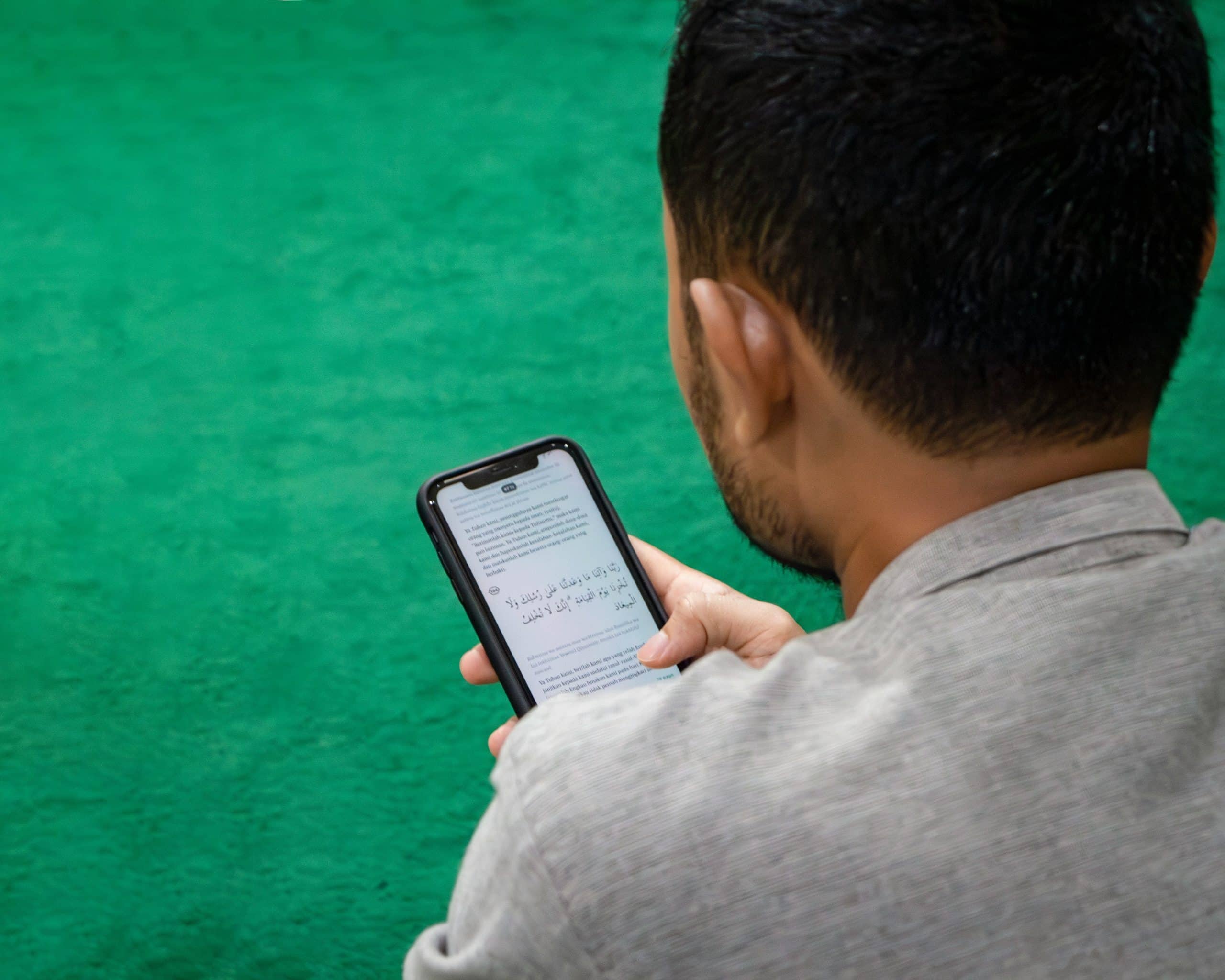
“The real challenge is not whether Muslims should use AI, but how to use it responsibly while avoiding harm (darar)” [PC: Masjid Pogung Dalangan (unsplash)]
- Protecting the Higher Goals of Shari‘ah (Maqasid al-Shari‘ah): These include protecting faith (din), life (nafs), intellect (aql), family (nasl), and property (mal). Every AI system should be judged on its impact here. For example, generative AI that produces deepfakes threatens the intellect and social cohesion, whereas AI used in medical diagnosis actively protects life.
- Justice (‘Adl) and Fairness (Qist): Islam mandates fairness. Training data often reflects historical social inequalities. If an AI used in hiring or credit scoring is trained on biased data, it perpetuates injustice. Technologists have a duty—each according to their capacity—to audit systems and remove these biases.
- Trustworthiness (Amanah) and Responsibility (Mas‘uliyyah): Humans are entrusted (khalifah) with stewardship of the earth, including technology. Developers must build AI that is safe and transparent. Crucially, responsibility cannot be outsourced to a machine; humans remain accountable for the AI’s effects. This also extends to environmental stewardship, considering the massive energy resources required to power data centers.
- Striving for Excellence (Ihsan): Ihsan means doing the best one can, as if in God’s presence. In software development, this means going beyond bare functionality to create technology that is beautiful, efficient, and truly beneficial, rather than predatory or addictive.
A critical distinction must be made regarding religious authority. While AI can search the Qur’an and Hadith faster than any human, the IIFA and Al-Azhar agree: AI cannot replace a human jurist (faqih).
Key reasons AI cannot replace human jurists include:
- Understanding the Spirit of the Law (Fiqh): Legal rulings require nuance and moral insight, not just pattern recognition.
- Understanding Real-Life Context (Waqi‘): A ruling must fit the specific situation, culture, and needs of the person asking.
- Spiritual Insight (Taqwa and Basirah): Fatwas come from a life of faith, study, and devotion. AI has no soul or spiritual consciousness.
AI excels at pattern recognition, but it lacks the soul and consciousness required for moral adjudication. It is a powerful research assistant, not a scholar.
A Simple Ethical Framework for UsersFor the everyday Muslim engaging with these tools, the following guide ensures responsible usage:
- Verify and Validate: Treat AI output as a starting point. Always cross-reference with the Qur’an, authenticated Hadith, and qualified scholars.
- Clarify Intention (Niyyah): Use AI for learning and solving problems, never for deception, finding “loopholes,” or generating deepfakes.
- Recognize Limits: AI is a tool, not an authority. It is fallible.
- Promote Good: Use AI to spread beneficial knowledge, while avoiding the spread of unverified information.
Perhaps one simple way to reflect on the use of AI is on the collective good (ummatic welfare). We should ask not only, “What can AI do for me?” but also, “What can AI do for the whole Muslim community?” In his article on Ummatic Soft Power, Ashraf Motiwala emphasizes how the use of AI will influence the future of the ummah: “Ummatic soft power must therefore operate on three fronts: (1) developing substantive Islamic perspectives on AI ethics; (2) influencing global discourse such that these perspectives are seen as viable and attractive; and (3) implementing them in actual technologies, through ummatic research labs, ethical standards, and applied AI platforms.” The consequence of this is that AI should be seen as a means of helping Muslims with the issue of revival, unity, and good governance.
By applying these principles, Muslims can ensure technology becomes a tool for ummatic welfare—helping with revival, unity, and good governance—rather than a source of confusion.
Operationalizing Ethics: The Case of Ansari ChatHow do these high-minded principles look when translated into actual code? One prominent attempt to answer this is Ansari Chat. Led by Dr. M. Waleed Kadous, Ansari serves as a useful case study in how to bridge the gap between Islamic scholarship and Silicon Valley engineering.
The project began in 2023 with a “proactive” philosophy. Rather than waiting for big tech companies to build Islamic tools as an afterthought, the Ansari team asked: What if the community shaped the technology to serve its unique values from the very beginning?
Transparency as Trust (Amanah)The first ethical decision the project made was regarding trustworthiness (Amanah). In a landscape dominated by proprietary “black box” algorithms, where the decisions made by the developers are hidden, the Ansari team committed to being open source.
This was a strategic ethical choice. For a tool dealing with sacred knowledge, the community needs to know how the answers are derived. Open source acts as a “public recipe,” allowing scholars and developers to inspect the code, verify the sources, and ensure there are no hidden agendas. This transparency builds a relationship of trust that proprietary models cannot easily match.
The Technical Fight Against Hallucination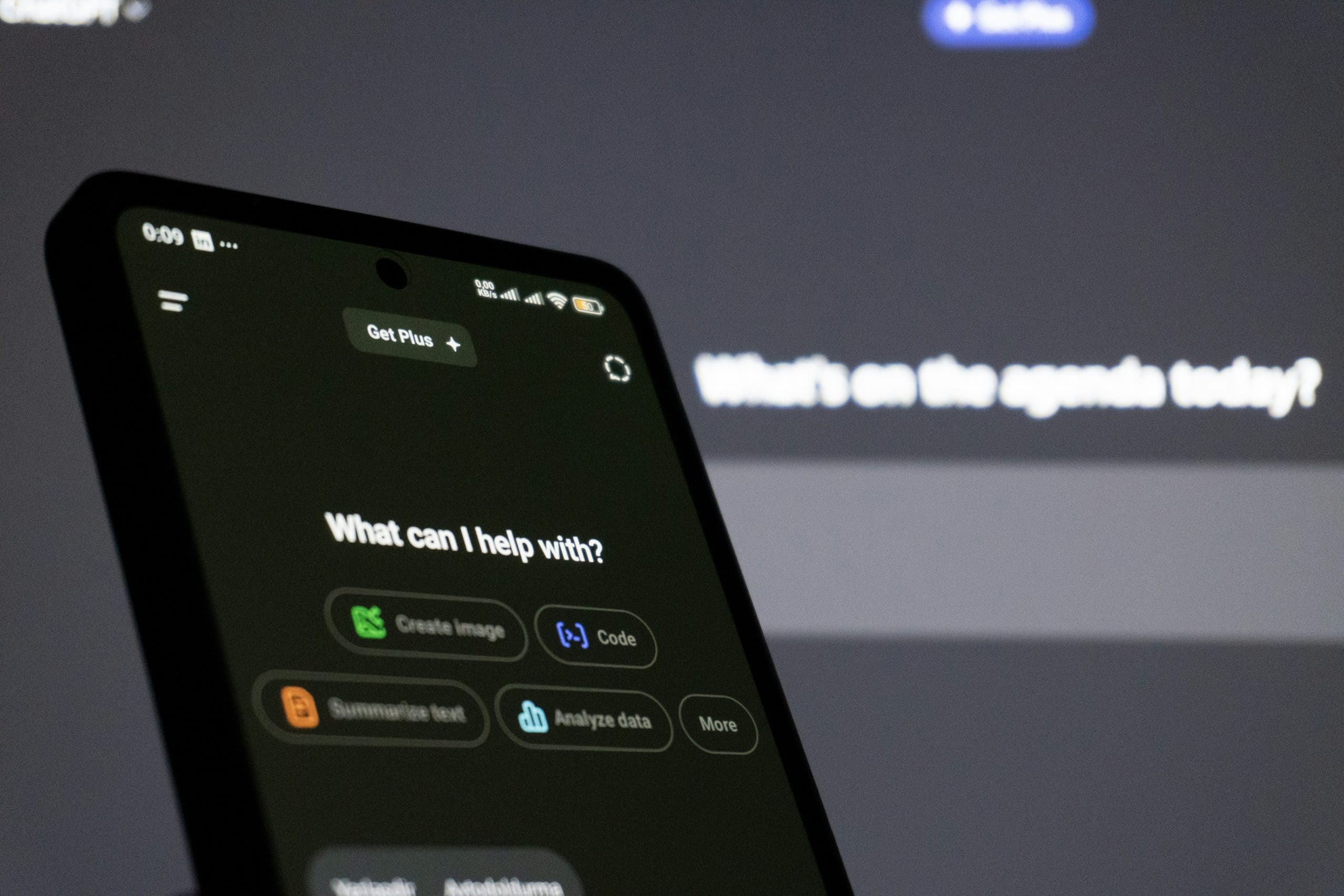
“The community response suggests a hunger for tools that respect religious context.” [PC: Zulfugar Karimov (unsplash)]
Applying the principle of accuracy and verification, the evolution of Ansari highlights the technical challenges of “Islamic AI.” Early versions, like many LLMs, were prone to “hallucinations”—sounding confident while being factually incorrect.To address this, the team shifted from a simple chatbot model to a Retrieval-Augmented Generation (RAG) system. In simple terms, this gives the AI an “open-book test.” Instead of inventing an answer, the AI must first look up relevant facts from a trusted database—including the Qur’an, Hadith collections, and extensive Fiqh encyclopedias—before formulating a response.
This shift drastically reduced inaccuracies. Furthermore, later iterations introduced citations, ensuring that answers include verse numbers and links to original texts. This feature supports the user’s duty to verify and validate, empowering them to check the primary sources rather than blindly trusting the machine.
Impact and UtilizationThe community response suggests a hunger for tools that respect religious context. By mid-2025, data showed that users were not just asking for trivia; they were asking about Fiqh (Islamic law) and Deen/Dunya balance. The tool has been accessed in over 20 languages, highlighting the global demand for accessible knowledge.
However, the project explicitly respects the boundaries of authority. It is designed to provide information and context, but stops short of replacing the scholar in complex, personalized rulings, aligning with the consensus of the IIFA and Al-Azhar mentioned earlier.
Conclusion: An Ecosystem of Ethical InnovationAnsari Chat, as an example, acts as a proof of concept for a broader vision: an ecosystem of Islamic AI. Whether through integrating with educational curricula, supporting local adaptations like Tanyalah Ustaz in Malaysia, or developing tools for academic research, the goal is to plant a “forest” of innovation.
The story of Ansari demonstrates that technology does not have to distance Muslims from tradition. When built with Ihsan (excellence) and Amanah (trust), AI can function as a bridge, making sacred knowledge more accessible and verifiable. It offers a blueprint for the future: a generation of Muslims who are not just consumers of technology, but architects of it, ensuring the digital age is navigated with faith, responsibility, and moral clarity.
Related:
– The Promise of SAIF: Towards a Radical Islamic Futurism
The post Faith And Algorithms: From An Ethical Framework For Islamic AI To Practical Application appeared first on MuslimMatters.org.
Bearing witness to the gruesome end of Western liberalism
Corporate journalism skewered in Omar El Akkad’s award-winning book on Gaza genocide.
Quebec Introduces Bill To Ban Prayer Rooms On College Campuses
The provincial government of Quebec, led by Premier Francois Legault’s Coalition Avenier Quebec (CAQ), has proposed sweeping new measures that would severely restrict the ability for Muslims to practice their faith in the province.
Bill 9, titled An Act for the reinforcement of laïcité in Quebec, lays out several new measures that aim to prohibit religious practice in the public sphere. While the Act doesn’t single out Islam explicitly, Muslim religious practices are the prime target of this new proposed law.
Among the proposed restrictions in the new law are the banning of public day care workers and even private school workers from wearing religious garments such as the hijab. The secularism law from 2019 had already banned public employees such as teachers, judges and police officers from wearing religious symbols. This law further advances those restrictions. Public institutions would be restricted from offering halal meals exclusively and would be required to offer non-halal options on the menu as well.
Public congregational prayer will also be banned for the first time in Quebec’s history under this new law. Individual prayer or a religious gathering with a permit in a public space would still be allowed. However, permits are said to be handed out on a case-by-case basis if they respect Quebec charter rights, such as the equality of men and women. Depending on how compliance with Quebec’s charter is interpreted, Muslim groups would likely face obstacles in receiving such a permit, considering the separate prayer for men and women in the Islamic tradition. Fines for individuals could go up to $375 and up to $1,125 for groups.
There has been uproar over public prayer in Quebec ever since it became a regular sight in the streets of Montreal over the last two years. These prayers have been happening in the context of weekly pro-Palestine rallies to protest the genocide in Gaza. The rallies usually end with a public prayer for Gaza and garnered headlines when pro-Palestine marchers prayed in front of the Notre-Dame Basilica. There was also backlash when a Muslim group held Eid prayers in a public park last year.
The situation has led the Secularism Minister Jean-François Roberge to declare that the “proliferation of street prayer is a serious and sensitive issue”. Furthermore, Premier Legault stated that “Seeing people praying in the streets, in public parks, is not something we want in Quebec,” and added that he wanted to send a “very clear message to Islamists.”
The most extreme measure proposed by Bill 9, however, is the plan to ban prayer rooms on university and college campuses. In defending his proposal, Minister Roberge explained that “Universities are not temple or church,” and argued that Quebec had “gone too far” in accommodating religious practices.
Prayer rooms on campuses are the centre of religious life for Muslim students across the province. They serve not only as a safe space for daily prayers but also as a hub for social programs like chaplaincy services, mental health counselling, and religious education. New students, especially those from abroad, use the prayer room to congregate and build social bonds that help them navigate the complexities of practicing faith in a secular environment.
Pragmatically, the prayer room also ensures that Muslims students, who are required religiously to pray five times a day, are not forced to pray out in the open. Samy Khelifi, president of Concordia’s Muslim Student Association, which hosts the biggest prayer facility on a Quebec campus, warned of students being pushed to pray in hallways: “People won’t stop praying because there’s not a prayer space. What happens to those 5,000 people if they all go pray out on random corners?”
Bill 9 will be subject to parliamentary commission hearings over the coming months; the government hopes to have it passed by next Spring. The provisions outlined in it are the latest in a long series of attacks, led by the CAQ, on the religious rights and liberties of Muslims in Quebec. Disguised in the name of secularism and presented with nationalistic overtones, the legislation is nothing more than an attempt to score political points by capitalizing on xenophobic sentiments in CAQ’s voter base for the upcoming elections.
Related:
– Poem and Reflection on Banning Prayer in Public Places | Ammar AlShukry
– The Duplicity of American Muslim Influencers And The ‘So-called Muslim Ban’
The post Quebec Introduces Bill To Ban Prayer Rooms On College Campuses appeared first on MuslimMatters.org.



